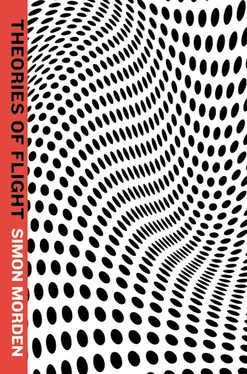From one end of the street, he couldn’t quite see the other using the camera on his head, so he looked down on the approaches to Waterloo Bridge using a satellite: it was wreathed in smoke. The Embankment was on fire: there were burning vehicles and the shells of waterfront buildings had been laid low.
The red markers on the map were winking out, by ones, two, threes, by the handful and the dozen. Where there had been a solid sheet of red, there were now gaps. A thin blue line rimmed the area, and pockets of blue showed where rooftop snipers poured fire on the people below.
“I can’t tell. Talk to me.”
[The situation is critical.] The AI showed him a series of views from the CCTV on Somerset House. [The attack helicopters have strafed the Embankment and are circling Farringdon Road. We will win there, but will lose Lancaster Place. The bridge will fall to the Outies.]
“No, it won’t.” He started to run again, moving the images of conflict to the corner of his attention in order to successfully navigate the street furniture.
[There is no logic behind your statement. Simply wishing for something to be so does not make it so.]
“ Potselui mou zhopy. This is going to work. Where are the tanks?”
[High Holborn.]
“Kingsway, Chancery Lane and Holborn Circus. Do it. Get the helicopters to kill as many as they can.”
[This is already happening. It will be too late. There are too many of them. We should pull back.]
“We’re committed here.”
[Then we will fail.]
There was a barricade across the street, cars and two buses, stacked by a mobile crane to resemble a giant Tetris game. The interiors were occupied, a wall of men and women committed to keeping the Outies from climbing up and over. They had long since run out of ammunition, and were reduced to poles and sticks, clubs and bats.
There were no reserves behind them, no one to replace them if they fell, or broke and ran.
“There were supposed to be more people right here.” Petrovitch pulled his trophy knife and stood nonplussed for a moment. “Where are the reinforcements?”
[They have not had time to arrive. Two thousand are massed at the Oshicora Tower, receiving uniforms and basic equipment… ]
“Yeah. Pizdets. ”
He saw the situation as the AI did. Sheer weight of numbers would overwhelm Lancaster Place. The approaches to the bridge would fall. All the defenders he’d so carefully placed along the Embankment and the Strand would be cut off. The tanks would come into play too late, the helicopters would do too little and, like those at the barricade, they’d run out of bullets soon enough.
So. It was time to turn the New Machine Jihad card face up on the table, and he didn’t know how anyone would react to that. His best guess would be he’d face a full-scale mutiny within the hour: the nikkeijin might follow Sonja’s orders, but the MEA militia, who’d witnessed the Long Night, and the EDF regulars, who’d watched it looped on the news for weeks, weren’t going to go along with it, not at all. He’d win the battle, and lose the war.
“How much do you want this?” he asked the AI. “Are you willing to risk everything? Your very existence in exchange for these fragile sacks of meat?”
[You said you would find me a home.]
“If the Outies break through, that dream is gone.”
[How much more will I end up with if I reveal myself now?]
“Could be nothing. Might be everything. It’s your call.” The first Outie made it to the top of the barricade. He was soon enough dragged down, but almost in an instant, another replaced him, and another. The defenders who remained alive heard the cry of triumph above them and, as fast as the sound traveled, they started to scramble out of their positions.
Everything slowed. Everything: even the processing power in Petrovitch’s rat was commandeered. The pain he had locked out using software blocks snapped back, and the camera strapped to the side of his head no longer fed its images into his brain. He was blind, in agony, suddenly alone. His life was laid bare with no illusions or delusions. This is what he had come to. At least with the Outies, who had to be swarming toward him, it was going to be mercifully short.
Unless they left him like that, curled up on the hard road, whimpering and crying. They could ignore him, and there would be nothing he could do about that.
Then, in the darkness, he heard the words. [We rise or fall together, Aleksandr Arkadev Milankovich: a true friend.]
No one had used that name for years. Sometimes he struggled to remember it himself. It was him, though. The same skinny street kid who had run wild through the prospekts of St. Petersburg lay on a Metrozone road, helpless and crippled, and he still had someone who would call him by his real name.
The world appeared sideways. At first, he was surprised that he could see at all, then by what he could see. The barricade was shaking itself apart, the highest vehicles falling either side, and carrying those who were clambering up them down.
The noise: the growling of engines that consumed every last drop of dead air and splashed it back out as vibrant, vibrating sound. Someone stooped to drag him up because their uniforms matched, but when Petrovitch turned his sightless eyes to face his would-be rescuer, he was dropped with a shout and shrinking revulsion.
His pain was receding again, leaving his skin prickling with the impression of a thousand sharp needles. He could stand on his own, as well as fill his voice with his own words.
“Hold!”
One or two stopped. Another three or four slowed.
“I said hold!”
So they waited, poised on their heels and ready to flee. There were half a dozen of them, a rag-bag of nikkeijin, Oshicora employees and a MEA militiaman.
“We’re done running.” He looked around at the disintegrating barricade. A dozen Outies were his side of it, picking themselves up. Injured, yes. Stunned, but not for long. He turned and aimed the point of his knife at the lead Outie. “There’ll be no more of that today. If anyone’s going to run, it’s them.”
“But the cars…”
“Are on our side. The New Machine Jihad is on our side. We have a chance now.” He readied himself for the charge. “Don’t screw up.”
Petrovitch ran at the enemy without worrying who was following him. He held the knife out by his side and dodged the end of a spear. He cut once, twice, and kept on going.
Someone else was in his path. He feinted low, high, then struck in the middle. The moves he used were fast and uncompromising. He was aiming to incapacitate, taking knowledge from somewhere out there and applying it ruthlessly.
If there had been anyone backing him up, they would have stopped the Outies. He discovered that he was entirely on his own.
His shoulders sagged. “Ah, chyort. ”
[One moment.]
“You keep saying that.” He was surrounded. He looked for somewhere to go, a route through. To the east, the Strand was a shifting chaos, a mess of cars moving forward and backward with helicopters clattering overhead, firing the last of their missiles. The cacophony almost drowned out the screaming.
To the west, more cars were edging forward. They couldn’t attack because of him. South lay the bridge, but he’d never make it.
[Look up.]
The crane hoist. Dangling from it were the loose strips of a webbing cradle. As it dipped toward him, he leaped up, throwing the knife at the face of his closest attacker. His fingers closed on rough material and he pulled his legs up out of the way.
He was rising into the air, but no matter how hard he told his hand to grip, he didn’t have enough muscle to support his weight for very long. He gritted his teeth and squeezed.
Читать дальше












